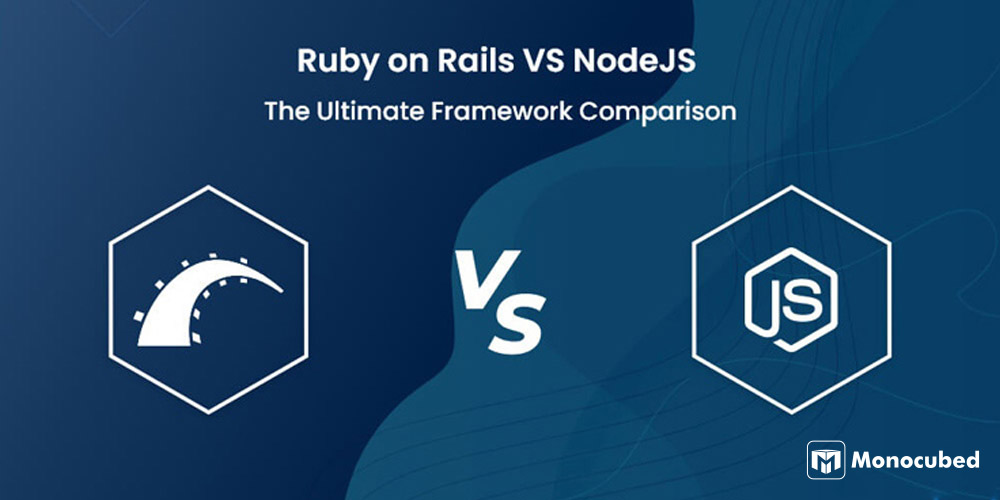With evolving technology, new frameworks and web development tools are emerging in the market. But too many options can lead to a lot of confusion and instability. When you work in a competitive field like web development, quick and optimal results are a must.
Node.JS and Ruby on Rails are two such very popular web technologies that will help you optimize your backend development process and receive rapid results without any hassle. But which tool should you use?
We bring you a Ruby on Rails vs Node.JS comparison to help you decide which is the superior tool. With this article, you will be able to determine which framework will suit your project. Ready to explore further?
Table of Content
Introduction To Ruby on Rails
Ruby on Rails is a web framework based on the Ruby programming language. Pragmatic and robust, Rails is used for the server-side development of performative websites and web applications. It follows MVC architecture to offer data consistency, abstraction, reusability, and testability.

Developed in 2005, Ruby on Rails is a front-end framework that can build large web-based applications that support heavy user traffic. It is a collection of libraries containing code snippets and reusable modules called Gems. The framework, believing in the ‘Convention Over Configuration’ approach, offers an easy-to-use environment with in-built conventions to RoR developers. For more information check out our other Ruby on Rails blogs.
Some features of Ruby on Rails are –
- ‘Don’t repeat yourself’ approach is followed, offering reusable components and modules to perform common tasks, such as a menu dashboard design or a contact form.
- Model View Controller(MVC) architecture – Allows demarcation between application logic and presentation layer.
- Support for regressive and unit testing – Automated tests are created by Rails for your program.
- It comes pre-installed with RubyGems.
- Object-Oriented concepts of Ruby are applied for better readability and manageability.
- Best coding practices employed to increase the productivity of programmers and deliver quick results.
A Brief: What Is Node.JS?
Node.JS is a JavaScript runtime environment that is used for executing server-side code. It is not a framework like Rails, but it assists developers in server-side development using the popular scripting language JavaScript. Running on the V8 engine, it can execute a JavaScript program outside a web browser.

Node.JS was developed to be a lightweight solution for web app development. Being a custom Node JS development company we use it for building scalable, high-performing apps. With a huge community of supporters, many popular companies use Node.JS in their technology stack. Corporations, such as GoDaddy, Groupon, Microsoft, and Amazon Web Services, use Node.JS as their JS runtime system.
Some features of Node.JS that make it such a popular choice are-
- Event-driven – An event managing system keeps track of the responses the server is to receive from already executed APIs
- Asynchronous – A Node.JS web server is asynchronous, meaning it doesn’t wait for a response from APIs
- NPM package manager – Inbuilt tool for package management that provides modules
- It uses a single thread for different connection requests, thus improving RAM usage and offers high scalability
- Node.JS uses non-blocking input-output (I/O) calls that support multiple concurrent connections to be held in the event loop.
- Avoids context switching process between threads, thus optimizing speed and performance
Want to Convert Your Web App Idea into Reality?
Talk to us. Let’s validate your idea for free and convert it into a highly performative web application.
Ruby on Rails VS NodeJS – 6 Major Differences
-
Performance and Speed
Node.JS websites and applications are exceptionally fast. Its usage of single threading for the execution of simultaneous racquets, and asynchronous processing, makes it a powerful development tool.
In comparison, Ruby on Rails is generally slower. Rails work slower than Node.JS applications because it comes built with many default utilities and functionalities. Although developers don’t spend time writing each component from scratch, it also makes the framework monolithic and slows down the speed, especially for small websites.
Although performatively slow, Ruby on Rails has a rapid development speed. It is very easy to start and develop a project as you have all the necessary tools for your access.
-
Libraries and Tools
The main reason web developers like working with modules are their reusability. You can also break down a complex piece of code into manageable chunks. Both Ruby on Rails and Node provides modules and packages for this purpose.
The package library in Rails is called Ruby Gems. Node.JS, on the other hand, has the NPM (Node package manager) that provides libraries and packages to automate tasks and avoid repetitive coding. Both RubyGems and NPM provide a standard format for developing npm packages with easy installation and version control.
-
Gem VS NPM
Gems are open source libraries of code and documentation that can be used in your program without explicitly adding it to your code. With an open-source community, there are Ruby on Rails experts who contribute new Gems for implementing new functionalities. Some common Gems are Rake, Bundler, RSpec, and Devise.
For more information, you can read our blog Top 20 Ruby on Rails Gems to Use in 2021.
NPM is a subsidiary of GitHub, which contains packages and libraries for working with JavaScript. Node.JS comes inbuilt with many modules that can be used without alteration. For other more unconventional tasks, NPM offers a command-line client for accessing and installing Node.JS modules. It is the most popular subsidiary for JavaScript developers.
-
Usage
Node.JS is used for implementing JavaScript in the frontend and backend. It is mainly preferred for building real-time applications. Many corporations, such as Shopify, Facebook use Node.JS in their web applications. It is a JavaScript runtime environment, unlike Rails.
Ruby on Rails, on the other hand, is specifically used for the rapid application development of database applications. With a powerful ORM (Object Relational Mapping) system as ActiveRecord, you can quickly develop content-heavy websites that require heavy and rapid database manipulation with this backend framework.
With its high productivity and DRF approach, you can also quickly create MVPs or Minimum Value Products prototypes of a full-fledged application. Contact us for getting custom RoR development services today.
-
Community
Both Node.JS and Ruby on Rails, being open-source, have a large, vibrant community. Having been in the market for so long, both have a cult of experienced developers and supporters. With a bigger community, there is a higher chance of you receiving help and guidance.
On Github, Ruby on Rails has 48.2K stars and more than 4200 contributors. Node.JS has 78.3K stars and 2959 committed contributors. While Node.JS clearly has more stars, the number of contributors of Rails is higher. Node.JS is the clear winner with a thriving community in this Node.JS vs Ruby on Rails comparison.
-
Threading
Ruby on Rails supports multi-threading. Rails can handle concurrent processing of multiple parts of a program code. This means Rails can utilize CPU time smartly and thus you can develop a very high functioning application. But for complex apps with many lines of code, it becomes tough to process multiple threads as the cost of context switching gets too high.
Node.JS, on the other hand, works on a single thread just like JavaScript. Using a single thread handled by the Event loop in javascript, Node.JS continually executes processes to jump to the next thread instead of waiting for an I/O operation or memory access. This way Node.JS uses a single thread to provide fast, scalable applications.
In this criteria, there is a tie for Rails vs Node.JS. Both Node.JS and Ruby on Rails are suited for a particular type of application development.
Thus we come to an end to the Ruby on Rails vs Node JS comparison. As evident, there is no clear winner, with both the web development tools having their own set of advantages. These defining criteria may help you choose the right technology in your website tech stack. It is important, along with differences, to also analyze your requirements before choosing the backend technology.
So let’s look at the advantages and disadvantages of using Ruby on Rails and Node.JS.
Pros and Cons of Node.JS Framework
Node.JS is very popular among JavaScript developers. Built on Chrome’s V8 engine, it is perfect for implementing JavaScript in the program code and the front-end of the website. Node.JS is so valuable in the development community because of the following benefits it offers –
- It uses only JavaScript throughout the application- both server and client-side.
- Lightweight, scalable and pragmatic, the environment is perfect for handling today’s fast-changing requirements.
- Node.JS is an event-driven software that can be used for developing web servers.
- Non-blocking I/O models ensure great scalability and high response time for user requests. Thus startups who require scalable websites should try using Node.JS.
- JSON support -Node.JS interacts with JSON without converting between binary models. This is especially useful in building RESTful APIs with NoSQL databases.
- Good for real-time applications like messenger chats, streaming websites, video conferencing apps.
But before choosing Node.JS, you should also consider the following drawbacks –
- Sharing a single thread between all clients’ requests can lead to issues in the Node.JS applications.
- High coding lines are required for simple tasks. NodeJS is not as productive or conventional as RoR.
- Not suitable for heavy computations as it would result in the choking of the single event-loop thread and cause problems for all users. All incoming requests would be blocked until the current request can be completed.
Pros and Cons of RoR Framework
Rails is a widely used web development framework that provides many advantages to developers. With this server-side framework, you can create seamless web applications. In this section, we will discuss the benefits and pitfalls of using Rails for project development.
The benefits of using Ruby on Rails for your website project are –
- As discussed, the DRY principle is very helpful in software development. When you are not repeating the same tasks, you save a lot of development time. Also, a single source of truth ensures that your code is easier to debug, maintain and integrate with third-party features.
- Ruby on Rails imposes a lot of conventions. There is always a “Rails way” of doing things. This means it is extremely easy to have an up and running app in a matter of days.
- High productivity is guaranteed when using Rails. It employs some of the best coding practices to remove unnecessary tasks. You spend less time writing code, and with fewer code lines you will have a more optimal website with exceptional code quality and features.
- Ruby on Rails has a great database integration in the form of ORM. You need not write any SQL code or query as it will be directly mapped to database tables. Plus, RoR is also flexible with most of the popular database environments and translates SQL interactions on its own.
- With the large community, the framework has attained, you can easily get customized RoR tools and libraries. Along with this, any questions you have will also be easily answered by many experts.
Want to Develop an MVP To Test Your Idea?
Design and develop a quick, low-cost MVP for your web application idea with our experienced Ruby on Rails development team.
As with all, there are some downsides to the framework. Some disadvantages that you may face while using Ruby on Rails are –
- It is not suitable for large applications that require a lot of dynamic interactions and high speed. Handling a large number of users might also lead to a problem with Rails.
- Multiple threading has many advantages, but it can also slow down your application and may cause some lags. This is not an issue with newer versions, but Rail websites are still relatively slow.
- Scalability is an issue with Ruby on Rails. If you are a startup, you might prefer to start small. But over time, when users increase, the Rails app might cause some issues, and you might need to migrate just like Twitter.
- Rails is very opinionated. Although the conventions and defaults may help increase productivity, it is tough to stand out in the market and do something creative. The main problem is Rails makes it very hard to deviate from the convention and implement alternatives.
What To Use – NodeJS OR Rails?
As evident from the NodeJS vs Ruby on Rails battle, no framework is better than the other. It is up to you to decide which will be more suited for your development project.

In general, we recommend using Ruby on Rails when you require a robust framework that can develop secure, highly performative web apps. On the contrary, when there is a requirement for a customizable coding environment that supports JavaScript applications, Node.JS should be preferred.
Node.JS is suited for your technology stack when you require one of the following –
- A microservice architecture framework
- Developing real-time apps and websites such as video-streaming websites, messenger or chat apps, email services
- Fast and productive server-side apps
- Handling large relational databases
- Developing RESTful APIs
- Scalability in your websites, especially suitable for startup businesses
- When developing everything using one language only – JavaScript on the frontend, backend, and native mobile applications
Ruby on Rails, on the other hand, should be preferred for web development when you are working on-
- High-traffic social networking sites
- Ecommerce applications that require stringent security protocols
- The quick development of apps, when working under strict deadlines
- SaaS projects or Software as a service projects
- Data analytics projects
- Content management systems
- Rails is perfect for creating MVPs and prototypes
- Single Page Applications that require quick data manipulations
Some popular companies, such as Airbnb and Facebook use Ruby on Rails for their websites. These popular website applications handle thousands of users simultaneously while ensuring top performance. LinkedIn, Uber, NASA are some companies that have used the Node.JS environment for their web apps.
Frequently Asked Questions
Is Ruby on Rails slower than Node.JS?
While its speed improves with every new version, Ruby on Rails is still a lot slower than Node.JS. Rails is an interpreted framework, which means the code is not compiled into machine language. This along with the memory-intensive multi-threading reduces the performance of an RoR website.
What can I use instead of Rails?
There are many alternatives to Ruby on Rails available in the market. Like mentioned, although Rails is a robust framework, it does have its own problems. For a more lightweight and minimalistic solution, you can use Sinatra. Hanami is also an excellent Ruby-based alternative that is apt for single-purpose applications that want to avoid the performance issues of Rails.
Is Node.JS dying?
No. NodeJS is the most popular backend environment of JavaScript. Most developers prefer Node.JS for its lightweight, scalable applications. Although there is a slight decline in its usage, there is no alternative to Node.JS that can compete with its wide range of functionalities. It is apt for developing web based apps and websites.
Conclusion
Ruby on Rails and Node.JS are both handy web development tools. With this Node JS vs Ruby on Rails comparison, we have compared their pros and cons to help you decide which tool to include in your technology stack.
The success of any website is hugely dependent on the web developers and the tools they use. Therefore, it is very important to find the ideal tools before developing. At Monocubed, we provide assistance for web development using state-of-the-art technologies. Our team of experts will understand your needs and design an ideal website for your project.
 By Jeel Patel
By Jeel Patel




